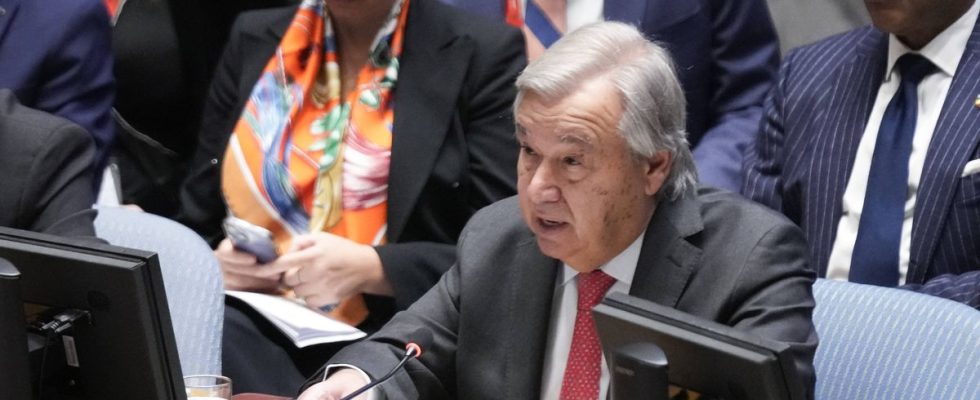As with Ukraine, the United Nations is deeply divided on the Middle East. Unsurprisingly, the UN Secretary General did not succeed on Tuesday in convincing the Security Council to adopt a common line on this issue. By denouncing the “clear violations” of humanitarian law in Gaza and calling for an “immediate humanitarian ceasefire”, Antonio Guterres even stoked tensions.
The Secretary General in fact provoked the anger of Israel, half-heartedly accusing it of justifying the bloody Hamas attack of October 7, while the Palestinian representative denounced the “inexcusable” inaction of the Security Council.
Guterres “deeply concerned”
“I am deeply concerned about the clear violations of international humanitarian law that we are seeing in Gaza. Let us be clear: no party to an armed conflict is above international humanitarian law,” the Secretary-General declared in the rarely so crowded Council Chamber. The humanitarian aid that began arriving in Gaza since Saturday via Egypt is only a “drop of aid in an ocean of needs” in this territory bombarded by Israel, he added.
Condemning once again the “horrific and unprecedented terrorist acts of Hamas”, he also noted that these attacks had “not occurred outside of any context”, always pleading for a two-state solution.
Israel wants secretary general to resign
“Mr. Secretary General, in what world do you live? “, replied Israeli Foreign Minister Eli Cohen. “Without a doubt, it’s not ours.” “How can you conclude a ceasefire agreement with someone who has sworn to kill and destroy your own existence,” he asked, canceling his meeting with Antonio Guterres. Israeli Ambassador to the UN Gilad Erdan called for the immediate resignation of Antonio Guterres, accusing him of being “comprehensive in the face of terrorism and murders” by Hamas.
The Palestinian Minister of Foreign Affairs, Riyad Al-Maliki, denounced the inaction of the Security Council in the face of “massacres (…) perpetrated by Israel”. “The failure of the Security Council is inexcusable,” he said, joined by several Arab countries. “The Security Council must take a clear position to reassure the 2 billion Arabs and Muslims that international law will be applied,” argued Jordanian Foreign Minister Ayman Safadi, on behalf of the 22 countries of the group. Arab.
Resolutions that don’t pass
Last week, the Security Council initially rejected a proposed Russian resolution calling for a “humanitarian ceasefire.” Only five of the 15 member states of the Council had supported this text which condemned “all violence against civilians and all terrorist acts”, but without naming Hamas. A second draft resolution from Brazil, which chairs the Council in October, received 12 votes in favor but was blocked by a US veto. Washington had criticized the lack of mention of “Israel’s right to defend itself”.
The United States has since circulated another draft resolution. “We all recognize the right and the imperative of States to defend themselves against terrorism,” insisted Tuesday Secretary of State Antony Blinken, who like his counterparts took advantage of this visit to the UN to increase the number of bilateral meetings. A new document that “we cannot support,” declared Russian Ambassador Vassili Nebenzia, indicating that he was working on an alternative text.
The head of Egyptian diplomacy Sameh Choukri was also “surprised” by a text without reference to a ceasefire “to prevent the deterioration of the situation which could lead the region towards a dangerous crossroads”.
The conflict before the General Assembly on Thursday
More than 1,400 people have been killed in Israel since the October 7 attack, mainly civilians massacred by Hamas that day, and some 220 Israeli, foreign or binational hostages have been identified by local authorities. Hamas, which controls Gaza, announced on Tuesday a new overall death toll of more than 5,791 deaths, including 2,360 children killed since the start of the war.
Faced with a divided Security Council, the UN General Assembly, whose resolutions are non-binding, will discuss this issue on Thursday.

